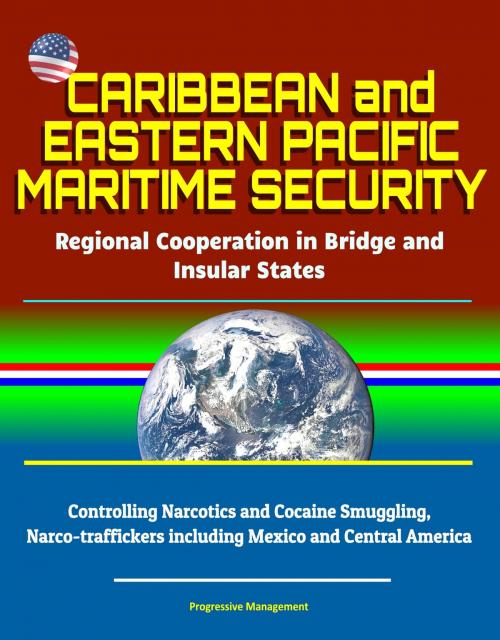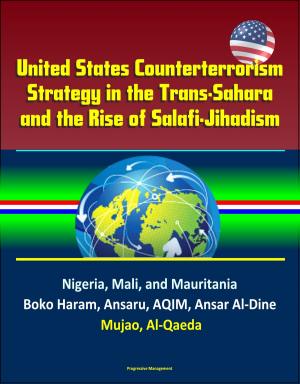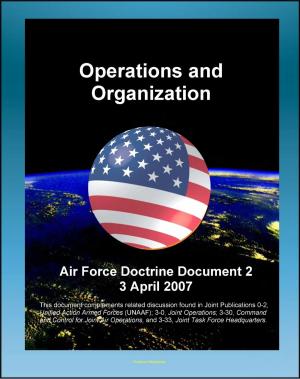Caribbean and Eastern Pacific Maritime Security: Regional Cooperation in Bridge and Insular States - Controlling Narcotics and Cocaine Smuggling, Narco-traffickers including Mexico and Central America
Nonfiction, Social & Cultural Studies, Political Science, Politics, Law Enforcement, True Crime| Author: | Progressive Management | ISBN: | 9780463050941 |
| Publisher: | Progressive Management | Publication: | June 11, 2018 |
| Imprint: | Smashwords Edition | Language: | English |
| Author: | Progressive Management |
| ISBN: | 9780463050941 |
| Publisher: | Progressive Management |
| Publication: | June 11, 2018 |
| Imprint: | Smashwords Edition |
| Language: | English |
This important 2018 report has been professionally converted for accurate flowing-text e-book format reproduction.
The international cocaine market has transformed the Caribbean Basin into the most violent region in the world. Against the onslaught of drugs and violence, interstate security cooperation and intelligence sharing are increasingly prominent features of state security strategies. The evolution of security cooperation has pushed cocaine flows from the Caribbean to Central America and the Eastern Pacific. Over time, increasing state capacity and cooperation has shaped cocaine trafficking and cut into the profit margins of cartel organizations. This thesis examines the evolution of maritime countertrafficking networks and argues that increased cooperation in the Insular Caribbean caused narcotraffickers to shift trafficking routes to regions without multilateral security mechanisms. Using naval strengths, interdiction data, and government estimates, we determined that security cooperation shaped current smuggling routes. We conclude that multilateral security arrangements are more effective against transnational criminal networks than unilateral state action. We point out the holes in the regional security network and call for a unified approach to transnational criminal networks. The regional hegemon has an outsized impact on regional security and must take steps to build and maintain multilateral relationships between Mexico and Central America to effectively control smuggling in the Eastern Pacific.
I. COOPERATIVE SECURITY AND INDIVIDUAL CAPACITY * COMPETING MODELS OF MARITIME SECURITY * A. MAJOR RESEARCH QUESTION * B. SIGNIFICANCE OF THE RESEARCH QUESTION * C. LITERATURE REVIEW * D. POTENTIAL EXPLANATIONS AND HYPOTHESES * E. RESEARCH DESIGN * F. DATA AND SOURCES * G. COOPERATIVE STRATEGIES AND THE CHANGING DYNAMICS OF THE WAR ON DRUGS * II. MARITIME SECURITY FORCES AND REGIONAL CAPABILITIES * A. DETERMINING REGIONAL COCAINE FLOWS * B. QUANTIFYING STRENGTH: GLOBAL RANKINGS * C. MSF STRENGTH DATA: RELATIVE STRENGTH AND REQUIREMENTS * D. STRENGTH AND INTERDICTION PERCENTAGE: CENTRAL AMERICA * E. STRENGTH AND INTERDICTION PERCENTAGE: INSULAR CARIBBEAN. * F. INTERCEPTORS * G. THE IMPORTANCE OF CUEING * 1. Maritime Patrol, Reconnaissance, and Surveillance * 2. RADAR Systems and Data Sharing * H. COMPARATIVE STRENGTH AND COUNTERINTUITIVE TRENDS * I. CASE STUDY PREVIEW * 1. Cuba: Shrinking Capability, Enhanced Security * 2. The Mexico Problem * J. CONCLUSION: NOT JUST PLATFORMS * III. THE CARIBBEAN AND COOPERATION * A. PHYSICAL AND HUMAN GEOGRAPHIES OF THE INSULAR CARIBBEAN * B. UN AND INTERNATIONAL TREATY STRUCTURES * C. CARICOM AND THE REGION * D. INSULAR CARIBBEAN CASE STUDIES * 1. The Regional Security System and the Organization of Eastern Caribbean States * 2. Cuba: Practical Cooperation * 3. Dominican Republic: Less Than Splendid Isolation * 4. Jamaica: An Inflection Point * E. CONCLUSIONS: CARIBBEAN SECURITY RELATIONSHIPS * IV. CENTRAL AMERICAN SECURITY: STRATEGIC DISUNITY IN THE CONTEXT OF AN ADAPTABLE SMUGGLING NETWORK * A. CENTRAL AMERICA: KEY GEOGRAPHIC ELEMENTS * B. MEXICO AND REGIONAL POWER * C. CENTRAL AMERICAN CASE STUDIES * 1. Guatemala: So Far From God, So Close to Mexico * 2. Honduras: Adopting the Guise of Counternarcotics Cooperation * 3. Panama: Intelligence Sharing against the Flood * D. CENTRAL AMERICAN INTEGRATION: A LONG-AWAITED, HALTING STEP * E. CONCLUSION: CENTRAL AMERICAN SECURITY RELATIONSHIPS * V. HEGEMONIC ACTION AGAINST A COMPLEX CRIMINAL THREAT * A. UNILATERAL ACTION: THE DEPLOYMENT OF AMERICAN MIGHT * B. BILATERAL RELATIONSHIPS: PARDON ME WHILE I ENFORCE YOUR LAWS * 1. Certification and Bilateral Aid Programs * 2. Bilateral Maritime Security Agreements * C. THE MANY FACES OF MULTILATERALISM * 1. Diplomatic Multilateralism: Budding Egalitarianism * 2. Financial Multilateralism: Underwriting Friendship * 3. Operational Multilateralism: The Hub and Spoke
This important 2018 report has been professionally converted for accurate flowing-text e-book format reproduction.
The international cocaine market has transformed the Caribbean Basin into the most violent region in the world. Against the onslaught of drugs and violence, interstate security cooperation and intelligence sharing are increasingly prominent features of state security strategies. The evolution of security cooperation has pushed cocaine flows from the Caribbean to Central America and the Eastern Pacific. Over time, increasing state capacity and cooperation has shaped cocaine trafficking and cut into the profit margins of cartel organizations. This thesis examines the evolution of maritime countertrafficking networks and argues that increased cooperation in the Insular Caribbean caused narcotraffickers to shift trafficking routes to regions without multilateral security mechanisms. Using naval strengths, interdiction data, and government estimates, we determined that security cooperation shaped current smuggling routes. We conclude that multilateral security arrangements are more effective against transnational criminal networks than unilateral state action. We point out the holes in the regional security network and call for a unified approach to transnational criminal networks. The regional hegemon has an outsized impact on regional security and must take steps to build and maintain multilateral relationships between Mexico and Central America to effectively control smuggling in the Eastern Pacific.
I. COOPERATIVE SECURITY AND INDIVIDUAL CAPACITY * COMPETING MODELS OF MARITIME SECURITY * A. MAJOR RESEARCH QUESTION * B. SIGNIFICANCE OF THE RESEARCH QUESTION * C. LITERATURE REVIEW * D. POTENTIAL EXPLANATIONS AND HYPOTHESES * E. RESEARCH DESIGN * F. DATA AND SOURCES * G. COOPERATIVE STRATEGIES AND THE CHANGING DYNAMICS OF THE WAR ON DRUGS * II. MARITIME SECURITY FORCES AND REGIONAL CAPABILITIES * A. DETERMINING REGIONAL COCAINE FLOWS * B. QUANTIFYING STRENGTH: GLOBAL RANKINGS * C. MSF STRENGTH DATA: RELATIVE STRENGTH AND REQUIREMENTS * D. STRENGTH AND INTERDICTION PERCENTAGE: CENTRAL AMERICA * E. STRENGTH AND INTERDICTION PERCENTAGE: INSULAR CARIBBEAN. * F. INTERCEPTORS * G. THE IMPORTANCE OF CUEING * 1. Maritime Patrol, Reconnaissance, and Surveillance * 2. RADAR Systems and Data Sharing * H. COMPARATIVE STRENGTH AND COUNTERINTUITIVE TRENDS * I. CASE STUDY PREVIEW * 1. Cuba: Shrinking Capability, Enhanced Security * 2. The Mexico Problem * J. CONCLUSION: NOT JUST PLATFORMS * III. THE CARIBBEAN AND COOPERATION * A. PHYSICAL AND HUMAN GEOGRAPHIES OF THE INSULAR CARIBBEAN * B. UN AND INTERNATIONAL TREATY STRUCTURES * C. CARICOM AND THE REGION * D. INSULAR CARIBBEAN CASE STUDIES * 1. The Regional Security System and the Organization of Eastern Caribbean States * 2. Cuba: Practical Cooperation * 3. Dominican Republic: Less Than Splendid Isolation * 4. Jamaica: An Inflection Point * E. CONCLUSIONS: CARIBBEAN SECURITY RELATIONSHIPS * IV. CENTRAL AMERICAN SECURITY: STRATEGIC DISUNITY IN THE CONTEXT OF AN ADAPTABLE SMUGGLING NETWORK * A. CENTRAL AMERICA: KEY GEOGRAPHIC ELEMENTS * B. MEXICO AND REGIONAL POWER * C. CENTRAL AMERICAN CASE STUDIES * 1. Guatemala: So Far From God, So Close to Mexico * 2. Honduras: Adopting the Guise of Counternarcotics Cooperation * 3. Panama: Intelligence Sharing against the Flood * D. CENTRAL AMERICAN INTEGRATION: A LONG-AWAITED, HALTING STEP * E. CONCLUSION: CENTRAL AMERICAN SECURITY RELATIONSHIPS * V. HEGEMONIC ACTION AGAINST A COMPLEX CRIMINAL THREAT * A. UNILATERAL ACTION: THE DEPLOYMENT OF AMERICAN MIGHT * B. BILATERAL RELATIONSHIPS: PARDON ME WHILE I ENFORCE YOUR LAWS * 1. Certification and Bilateral Aid Programs * 2. Bilateral Maritime Security Agreements * C. THE MANY FACES OF MULTILATERALISM * 1. Diplomatic Multilateralism: Budding Egalitarianism * 2. Financial Multilateralism: Underwriting Friendship * 3. Operational Multilateralism: The Hub and Spoke















